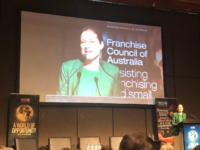Exiting an investment prior to the completion of the agreement is often a lengthy and time-consuming process, but one franchisee has taken things into her own hands, quite literally.
On Sunday morning, Darwin locals looking for a caffeine-fix at Crave caf were shocked to discover the entire building had been ripped from the ground and shifted overnight.
Kimdelia Cole and her husband, Rod entered into a franchise agreement with Perth-based coffee company, Muzz Buzz for a drive-through store in Darwin city, however a series of bitter disputes between Cole and the franchisor turned the relationship sour.
Earlier this month, Cole lodged a notice of dispute to terminate her franchise agreement with the chain before repainting the building and reopening as independent caf, Crave, breaching the agreement with Muzz Buzz which still operates the lease for the plot.
Determined to take-back what they deemed rightfully theirs, the Coles removed the 4×12 metre drive-through caf under the cover of darkness, and without a permit.
“We don’t want to come to any new agreement with Muzz Buzz corporate” Cole said in an interview with ntnews.com.au.
“But the lease for the plot our building is on is signed to Muzz Buzz corporate and they said they’re going to evict us from our own building unless we repaint everything again and go back to Muzz Buzz.”
Now, Muzz Buzz is considering legal action in a bizarre story that highlights the importance of understanding the franchise agreement and legal leasing requirements.
Warren Reynolds, Muzz Buzz chairman said that while Cole owns the building in which she operates, the licence belongs to Muzz Buzz.
“It’s her building, but we have the trademark rights over the building and it can’t be used for anything but a Muzz Buzz and she was well aware of that,” Reynolds said.
Cole has claimed that the business had no sublease, citing that as a major agreement flaw, however, Robert Toth, accredited business law specialist at Marsh & Maher Richmond Bennison Lawyers believes she would have breached her obligations regardless.
“Having a sublease provides slightly better protection between you and the landlord, but she would have breached her obligations as a subleaser as is,” Toth said.
“This is a unique situation where the franchisee has something that is removeable. Tenants are entitled to remove loose items that they have bought for the business, but not necessarily the fixtures themselves”.
“What she has done by removing the structure has exposed herself to claims of loss and damage, and actually armed the franchisor and put them in a better position to take legal action.”
Toth said that Cole’s actions have now effectively terminated the franchise agreement, providing the franchisor with the right to claim compensation.
“It enables the franchisor to repudiate the franchise agreement. She obviously has no intentions of continuing on in the business, which brings her franchise agreement to an end, however, exposes her to further legal action,” Toth said.
“Now it’s a matter of whether the franchisor wants to pursue the guarantors, there might be security deposits or bank guarantees that were provided as part of the franchise agreement.”
The matter will go before the court later this year, with dates to be confirmed.
















